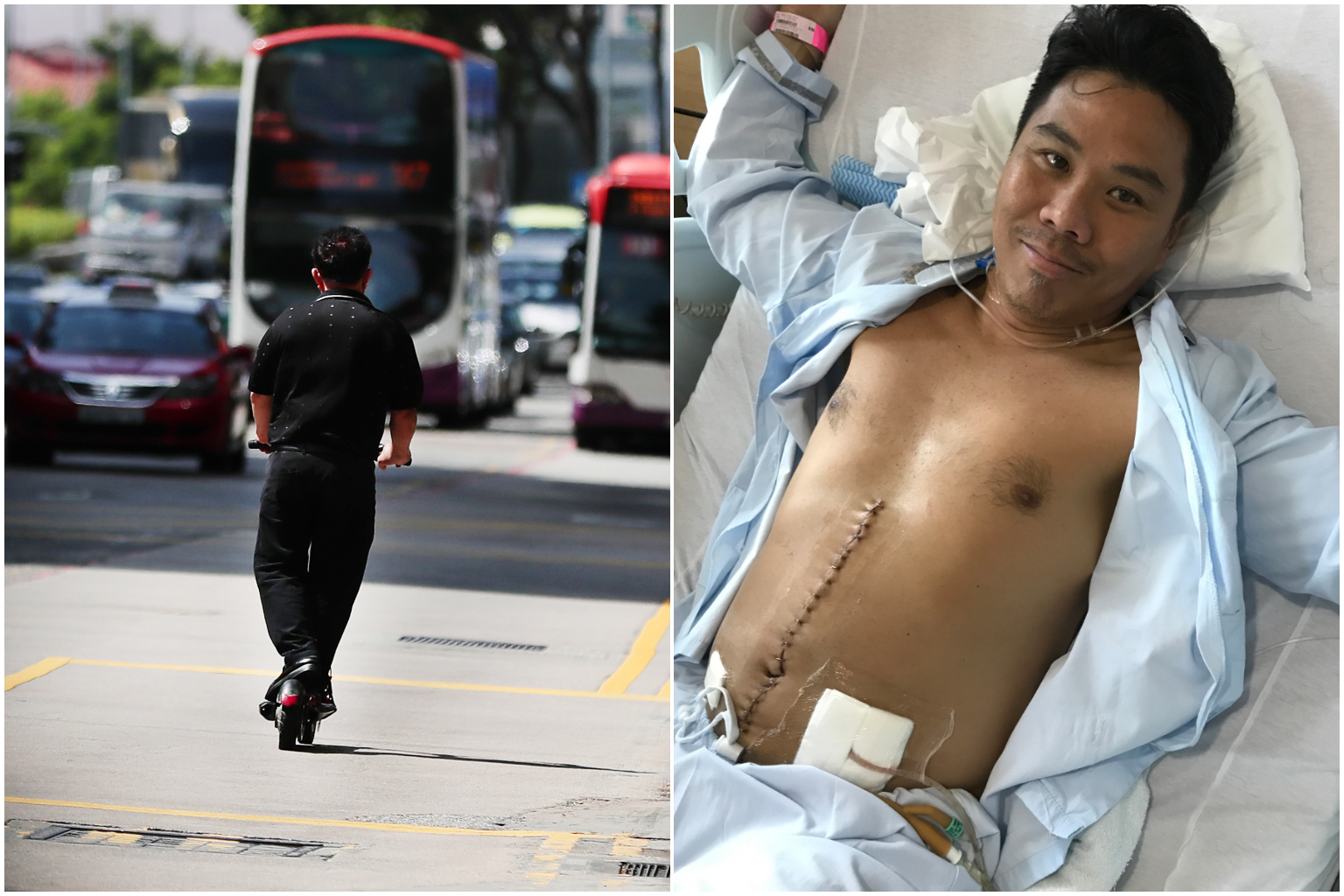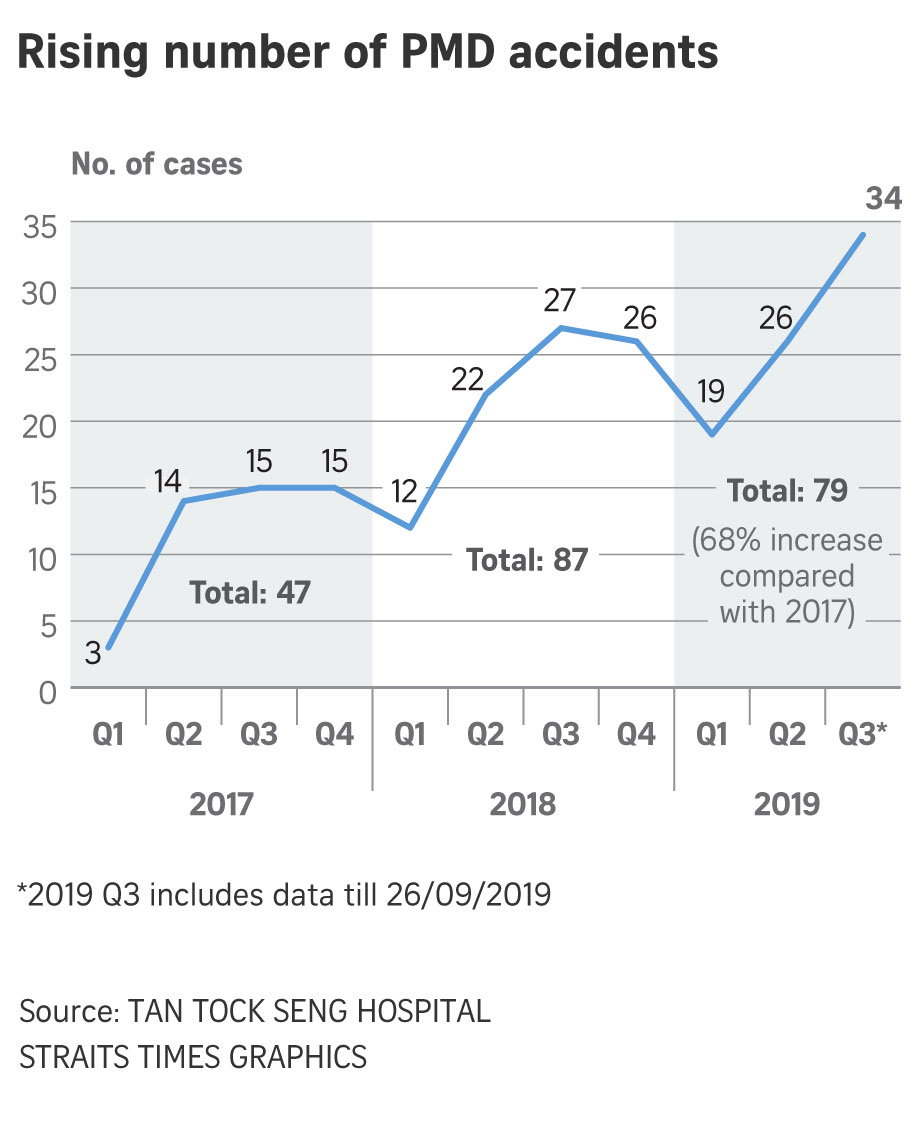TTSH reports spike in injuries involving PMD riders
Sign up now: Get ST's newsletters delivered to your inbox

(Left) A man riding an electric scooter against traffic in Bugis, on May 23, 2019. Mr Davy Yiu (right) got into an accident while riding a PMD in November 2017 and crushed his spleen.
PHOTOS: ST FILE, COURTESY OF DAVY YIU
SINGAPORE - Trauma doctors at Tan Tock Seng Hospital (TTSH) are seeing a rise in injuries suffered by personal mobility device (PMD) riders, according to a study conducted by the hospital over a 33-month period.
In the first nine months of this year, 79 PMD riders were admitted to TTSH for injuries, or an average of nine a month. This is compared with 87 last year, or seven a month; and 47 in 2017, or four a month.
This translates to a nearly 70 per cent increase in two years.
The figures come on the back of a national study completed earlier this year by Dr Wong Ting Hway, a general surgeon at Singapore General Hospital.
The national study found that there was twice the risk of hospitalisation as a result of injuries when using powered PMDs, compared with manual devices.
Both studies did not cover third-party injuries, such as pedestrians or cyclists in a collision with PMDs.
In the TTSH study, the hospital found that more than half of the PMD riders it treated for injuries were between 20 and 39 years old - similar to the median age of 33 in the SGH study.
TTSH said head and neck injuries accounted for the highest percentage of cases at 41 per cent, followed by external injuries such as abrasions and lacerations (26 per cent) and facial injuries (12 per cent).
A large percentage of those admitted had serious injuries; and more than half the PMD riders admitted were injured when they skidded. In the period studied, the hospital also witnessed six fatalities.
In February this year, the speed limit for PMDs on footpaths was cut from 15kmh to 10kmh.
Dr Teo Li Tserng, director of Trauma Services at TTSH, told The Straits Times: "What stood out is that despite PMDs being relatively slow, the severity of injuries related to them is no less than those incurred by motorcyclists."
He noted, too, that the injured tend to be "young people who should be up and about contributing to society". He said "one-third" of these injured riders went away with "long-term disabilities".
He said these cases have increased the hospital's load, "but it's something we have to adapt to".
He recommended simple precautions that riders can take to reduce the risk of injury, such as wearing a helmet and proper attire when riding.
"None of those we attended to wore helmets," he said. "To start, perhaps companies can issue helmets to their riders."
Dr Teo added that many of the injured riders said they were avoiding pedestrians when they skidded.
Mr Davy Yiu is a case in point. The 48-year-old business owner was crossing a street on an e-scooter in November 2017 when he avoided two pedestrians. He could not slow down in time because the cruise control was engaged.
As a result, he clipped a fence as he turned into a walkway, lost control, landed on the device and crushed his spleen.
"I thought I had collapsed a lung, because I couldn't breath for about 15 minutes. But after I got home, I passed out," he said.
Doctors had to remove his spleen, an organ which acts as a blood filter and is crucial to the body's immune system.
Mr Yiu said he still rides an e-scooter because he lives close to where he works. "But I make sure the cruise control is disengaged."
As a public service, TTSH is organising a public forum on PMDs. It is the first hospital here to do so.
Titled "Life doesn't have a reset button. Ride safe", the forum will be held on Saturday (Oct 26), from 10am to 12pm, at the TTSH Theatrette, Level 1.
Early this month, Senior Minister of State for Transport Janil Puthucheary told Parliament that the Government may ban PMDs if rider behaviour does not improve.
He was expressing concern over the number of accidents involving PMDs that had risen with their increasing use.



